
Advances in Laboratory Medicine-Avances en Medicina de Laboratorio
Scope & Guideline
Pioneering Research in Medical Laboratory Technology.
Introduction
Aims and Scopes
- Clinical Diagnostics and Biomarkers:
A core research area involves the exploration and validation of clinical diagnostics and biomarkers for various diseases. This includes studies on the sensitivity and specificity of tests, as well as their implications for patient management. - Laboratory Methodologies and Innovations:
The journal emphasizes new laboratory methodologies, including advancements in mass spectrometry, point-of-care testing, and automation in laboratory processes. This focus aims to improve the accuracy, efficiency, and reliability of laboratory diagnostics. - Quality Assurance and Standardization:
There is a consistent emphasis on quality assurance processes and the establishment of standardization protocols in laboratory medicine. This includes adherence to international standards, such as ISO 15189, to ensure the reliability of laboratory results. - Translational Research in Laboratory Medicine:
The journal supports translational research that connects laboratory findings with clinical applications, enhancing the understanding of disease mechanisms and improving patient outcomes through better diagnostic tools. - Interdisciplinary Collaboration:
The journal promotes interdisciplinary collaboration, integrating insights from various fields such as genetics, biochemistry, and clinical medicine to advance laboratory practices and patient care.
Trending and Emerging
- Integration of Artificial Intelligence and Big Data:
There is a growing trend towards the integration of artificial intelligence and big data analytics in laboratory medicine. This emerging theme focuses on leveraging data for predictive diagnostics, enhancing laboratory efficiency, and improving patient outcomes. - Molecular Diagnostics and Genetic Testing:
An increased emphasis on molecular diagnostics and genetic testing is evident, reflecting the rising importance of personalized medicine. Studies exploring genetic markers, pharmacogenomics, and their implications for treatment strategies are on the rise. - Impact of COVID-19 on Laboratory Practices:
The COVID-19 pandemic has significantly influenced research themes, with numerous studies examining the impact of the pandemic on laboratory practices, diagnostics, and patient management. This trend highlights the need for adaptability and innovation in laboratory settings. - Point-of-Care Testing Innovations:
Research on point-of-care testing (POCT) is gaining traction, focusing on the development and validation of rapid diagnostic tools that can be used in various settings. This trend aligns with the global push for accessible and efficient healthcare solutions. - Nutritional Biochemistry and Metabolic Health:
Emerging studies on nutritional biochemistry and its implications for metabolic health are becoming more common. This trend underscores the critical role of laboratory medicine in understanding and managing conditions related to nutrition, such as obesity and diabetes.
Declining or Waning
- Traditional Hematology Techniques:
Research focusing on traditional hematology techniques appears to be decreasing, as newer technologies and methodologies gain prominence. There is a notable shift towards more advanced diagnostic tools and less emphasis on conventional methods. - General Disease Awareness Studies:
Publications centered on general disease awareness and basic epidemiological studies have seen a decline, indicating a move towards more specialized and technical research that directly impacts diagnostic practices. - Basic Biochemical Analyses:
There is a waning interest in basic biochemical analyses without a clear clinical application or innovation. The journal's focus is shifting towards studies that provide new insights or methodologies rather than routine biochemical evaluations.
Similar Journals
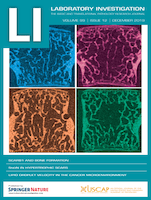
LABORATORY INVESTIGATION
Enriching Knowledge in Pathology and Forensic MedicineLaboratory Investigation is a premier academic journal published by Elsevier Science Inc, specializing in the fields of Pathology, Forensic Medicine, Cell Biology, and Molecular Biology. With its ISSN 0023-6837 and E-ISSN 1530-0307, this journal has been a significant contributor to scientific discourse since its inception in 1952, converging into its current form by 2024. It holds an impressive standing in its respective fields, featuring a 2023 Journal Rank of Q2 in both Cell Biology and Molecular Biology, and an elite Q1 ranking in Pathology and Forensic Medicine, reflecting its influence and quality of research, as seen in its Scopus ranks—17th out of 208 in Pathology and Forensic Medicine. Although it does not offer Open Access options, the journal remains a vital resource for researchers, professionals, and students who seek to disseminate and engage with high-caliber research findings. The importance of Laboratory Investigation is underscored by its commitment to advancing the understanding of laboratory and translational medicine, paving the way for innovations that enhance clinical practices.
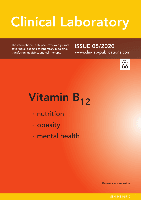
Clinical Laboratory
Exploring the Future of Laboratory ScienceClinical Laboratory is a reputable journal dedicated to the interdisciplinary field of clinical biochemistry, genetics, and molecular biology. Published by CLIN LAB PUBL in Germany, this journal provides a platform for the dissemination of original research, reviews, and key insights into laboratory practices and innovations that play a crucial role in modern medicine and diagnostics. With an ISSN of 1433-6510 and a consistent publication history since its inception in 1964 and converging through 2024, it is indexed within the Scopus database, ranking in the 30th percentile among its peers. Although classified in the third quartile for 2023 in the field, Clinical Laboratory continues to contribute valuable knowledge and fosters collaboration among researchers, professionals, and students. Notably, it does not currently operate as an Open Access journal, which emphasizes its commitment to maintaining high-quality peer-reviewed content accessible through institutional and library subscriptions. For those in the domain, Clinical Laboratory serves as a vital resource for the latest advancements and trends shaping the future of clinical laboratory science.

Biochemia Medica
Elevating Knowledge in Medical BiochemistryBiochemia Medica is a premier open-access journal that has been at the forefront of advancing knowledge in the fields of medical biochemistry and laboratory medicine since its inception in 2006. Published by the Croatian Society of Medical Biochemistry & Laboratory Medicine, this journal serves a vital role in disseminating high-quality research findings and reviews that contribute to the understanding of biochemical processes in health and disease. With an impressive performance in the Scopus ranking, it holds a Q2 quartile category in both medical biochemistry and clinical biochemistry for 2023, reflecting its commitment to scholarly excellence and relevance in the field. As an open-access journal, Biochemia Medica ensures that research is freely accessible, fostering collaboration and innovation among researchers, healthcare professionals, and students globally. Positioned within a rapidly evolving scientific landscape, this journal is dedicated to bridging the gap between laboratory research and clinical application, making it an indispensable resource for anyone interested in the intersections of biochemistry and medicine.
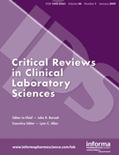
CRITICAL REVIEWS IN CLINICAL LABORATORY SCIENCES
Advancing Knowledge in Clinical Laboratory PracticesCRITICAL REVIEWS IN CLINICAL LABORATORY SCIENCES, published by Taylor & Francis Ltd, stands as a premier journal in the field of clinical laboratory science, addressing pivotal advancements and challenges since its inception in 1970. With a commendable impact factor derived from its ranking in Q1 categories across multiple disciplines—including Biochemistry, Genetics and Molecular Biology, and Clinical Biochemistry—this journal is a critical resource for researchers, clinicians, and educators aiming to deepen their understanding and application of laboratory science. The journal's rigorous peer-review process ensures that only the highest quality research is published, providing a platform for profound discussions that influence laboratory practices globally. Although not an open-access journal, it offers various subscription options to facilitate access to its wealth of knowledge. Operating out of Abingdon, England, CRITICAL REVIEWS IN CLINICAL LABORATORY SCIENCES continues to shape the future of clinical biochemistry and laboratory research through its insightful articles, systematic reviews, and expert commentaries, making it an essential read for professionals eager to stay at the forefront of their field.

Pathology and Laboratory Medicine International
Empowering laboratory medicine with cutting-edge research.Pathology and Laboratory Medicine International is a premier open-access journal, published by DOVE MEDICAL PRESS LTD, dedicated to advancing the field of pathology and laboratory medicine. Since its inception in 2009, this journal has provided a vital platform for researchers, clinicians, and educators to disseminate findings, challenges, and innovations that shape laboratory practices and pathology diagnostics. With an emphasis on peer-reviewed, high-quality research, Pathology and Laboratory Medicine International aims to enhance knowledge and improve clinical outcomes by sharing best practices and emerging trends in the discipline. As an open-access publication, it ensures global accessibility to critical research findings, fostering an inclusive academic environment. The journal holds a commendable reputation within the scientific community, making it a valuable resource for students, professionals, and researchers committed to excellence in the field.

NEOPLASMA
Elevating Knowledge in Oncology and BeyondNEOPLASMA is a prominent journal published by AEPRESS SRO, dedicated to the multifaceted field of oncology and cancer research. Since its inception in 1957, this esteemed publication has served as a vital platform for advancing the understanding of neoplastic diseases, disseminating high-quality research findings that contribute to clinical and laboratory advancements. Operating under a robust framework of peer review, NEOPLASMA holds significant credibility, as evidenced by its Q2 ranking in the Medicine (miscellaneous) category and Q3 rankings in both Cancer Research and Oncology for 2023. Furthermore, with an ISSN of 0028-2685 and E-ISSN 1338-4317, the journal fosters accessibility to valuable scientific content despite the absence of open access options. Positioned in Bratislava, Slovakia, NEOPLASMA continues to attract a global readership, making substantial contributions to the fields of biochemistry, genetics, and molecular biology as highlighted by its Scopus rankings. This journal is essential reading for researchers, professionals, and students looking to stay abreast of the latest developments in cancer research and treatment strategies.

Current Medical Science
Pioneering Discoveries in Medical ScienceCurrent Medical Science is a prominent academic journal dedicated to advancing knowledge in the fields of Medicine, Biochemistry, and Genetics. Published by SPRINGER with an ISSN of 2096-5230 and E-ISSN 2523-899X, this journal is based in China and serves as a vital resource for researchers, professionals, and students alike. With a focus on innovative research and emerging trends, Current Medical Science has established itself with an impactful presence, operating under Open Access guidelines to ensure wide dissemination of scientific findings. The journal's recognition is underscored by its impressive Scopus rankings, including a Q3 quartile placement in Biochemistry and Genetics as of 2023. It is noteworthy that the journal spans converged years from 2018 to 2024, providing a comprehensive platform for scholarly discussions and developments that drive the evolution of medical science. As it continues to publish influential research, Current Medical Science plays an essential role in bridging the gap between laboratory science and clinical application.
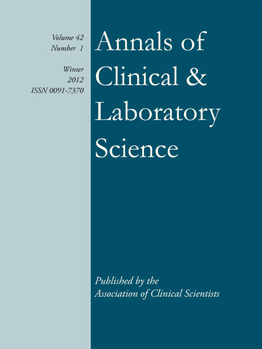
ANNALS OF CLINICAL AND LABORATORY SCIENCE
Connecting Researchers and Practitioners in Health ScienceANNALS OF CLINICAL AND LABORATORY SCIENCE, published by the Association of Clinical Scientists, is a pivotal journal in the fields of clinical biochemistry, hematology, immunology, and medical laboratory technology. Since its inception in 1971, this journal has become a vital resource for researchers and practitioners aiming to advance their knowledge and skills in laboratory sciences. Although currently not an open access journal, its rich repository of peer-reviewed articles and studies contributes significantly to the academic discourse in diagnostic and therapeutic practices. The journal is categorized in various quartiles, reflecting its impact and contributions to multiple scientific domains, such as Q4 in Clinical Biochemistry and Q3 in Pathology and Forensic Medicine as of 2023. With an extensive convergence of years up to 2024, it proves to be a timeless source for emerging trends and research innovations. The ANNALS OF CLINICAL AND LABORATORY SCIENCE not only supports the professional development of its readers but also encourages interdisciplinary collaboration, making it an essential tool for professionals, students, and researchers dedicated to improving health outcomes through advanced laboratory sciences.

Translational Medicine at UniSa
Pioneering the Future of Translational MedicineTranslational Medicine at UniSa, published by the esteemed UNIV STUDI SALERNO, serves as a pivotal platform for disseminating innovative research in the field of translational medicine. With its ISSN 2239-9747, this journal aims to bridge the gap between laboratory research and clinical application, facilitating the transformation of scientific findings into practical healthcare solutions. Committed to fostering collaboration among researchers, clinicians, and educators, Translational Medicine at UniSa aspires to enhance evidence-based medicine practices and improve patient outcomes. Although the journal is not currently open access, its rigorous peer-review process ensures that only high-quality research reaches its audience. As an influential publication in the realm of medical research, it is essential for professionals, researchers, and students seeking to stay at the forefront of advancements in translational medicine.
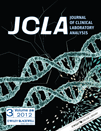
JOURNAL OF CLINICAL LABORATORY ANALYSIS
Empowering professionals with cutting-edge laboratory insights.JOURNAL OF CLINICAL LABORATORY ANALYSIS is a premier, peer-reviewed journal published by WILEY, focusing on the expansive field of laboratory medicine. With its ISSN 0887-8013 and E-ISSN 1098-2825, this open access journal has been serving the scientific community since 1987. As of 2023, it holds a notable impact in various domains, achieving category quartiles in Biochemistry, Clinical Biochemistry, Hematology, and more, showcasing its significance across multiple disciplines such as Medical Laboratory Technology and Public Health. Ranked impressively, it is placed 7th in Medical Laboratory Technology, reflecting its crucial role in advancing clinical practice and research. The journal aims to disseminate innovative research findings, methodologies, and reviews that can catalyze advancements in laboratory practices and improve patient outcomes. Accessible to a global audience since its transition to open access in 2019, the journal is not just limited to professionals but is also a valuable resource for students and researchers seeking to stay updated in this dynamic field. For more information, visit the journal's website.